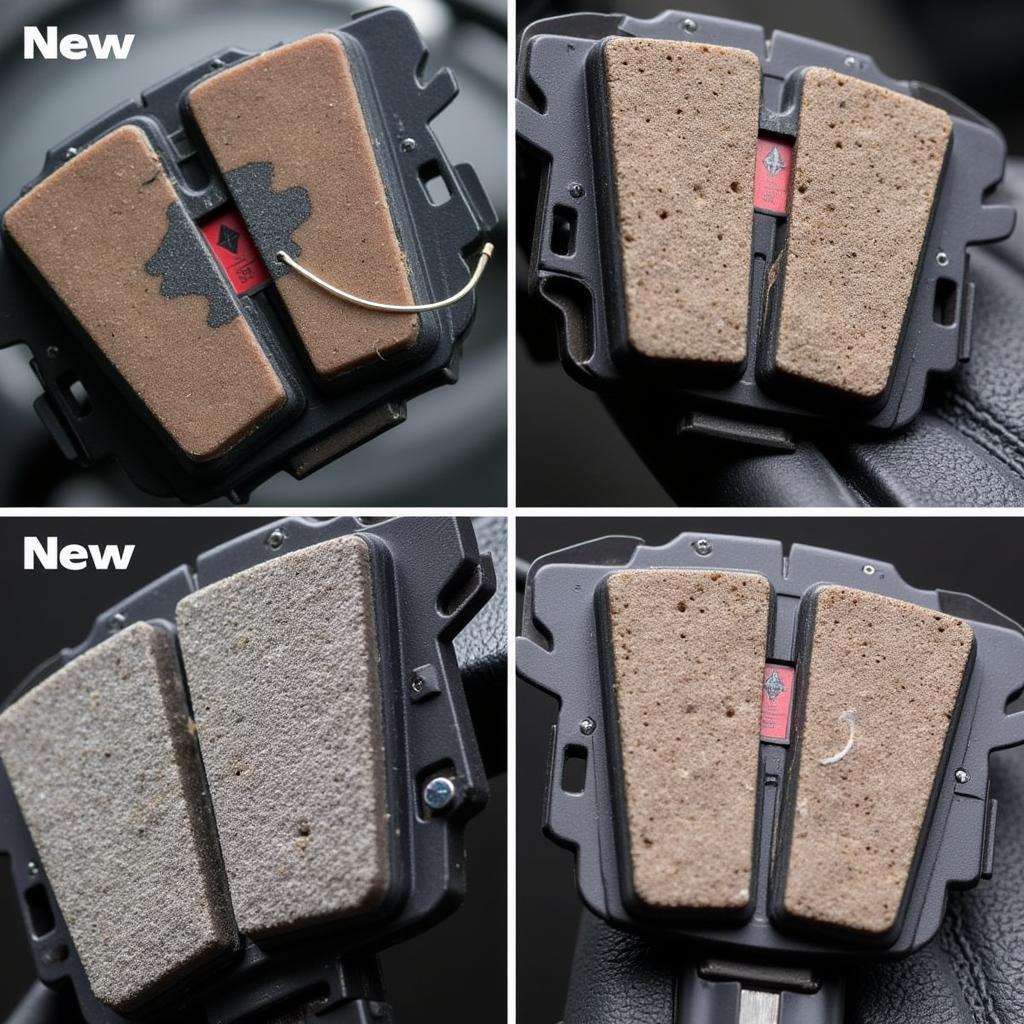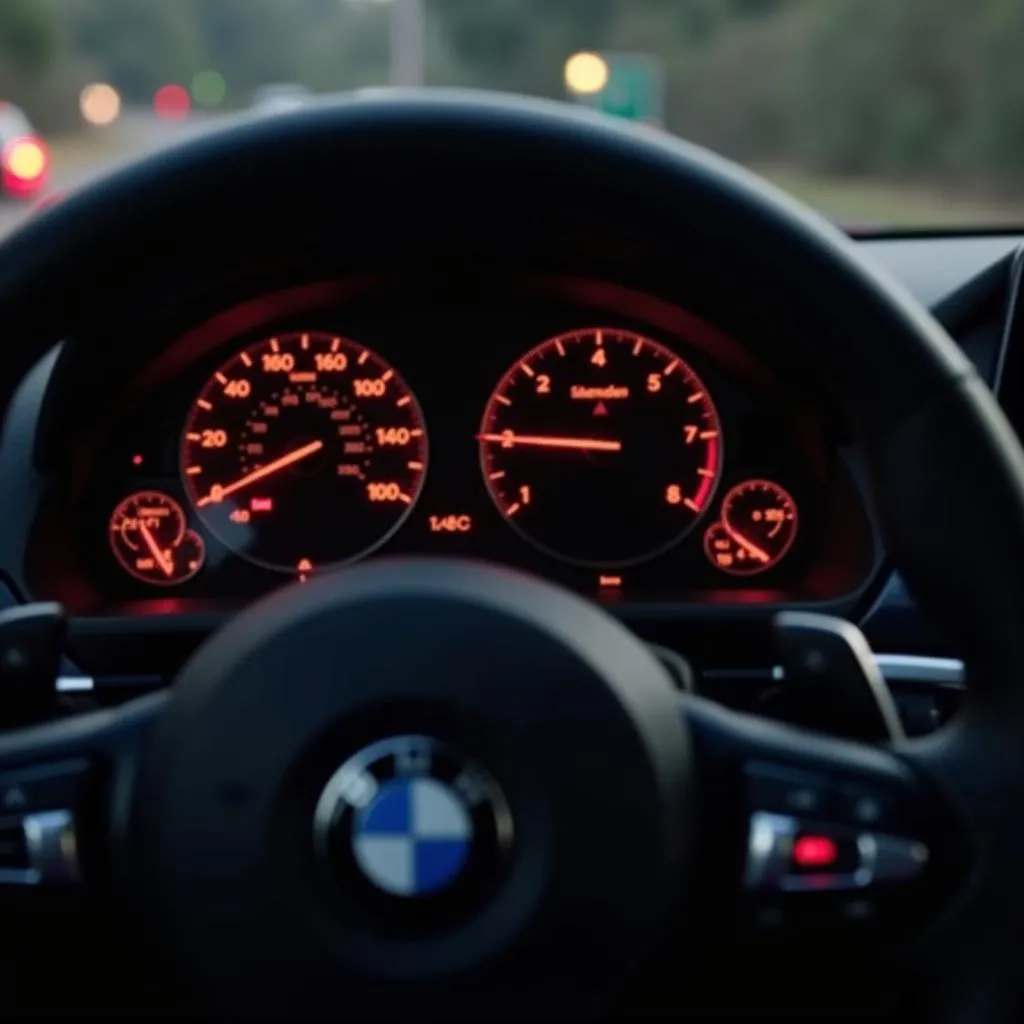The brake pads warning light on your Audi is a crucial safety indicator. Ignoring it can lead to costly repairs and compromise your safety. This guide covers everything you need to know about the Audi brake pad warning light, from understanding its meaning to troubleshooting and fixing the issue.
Why is my Audi brake pad warning light on? Several factors can trigger the brake pad warning light, ranging from worn brake pads to sensor malfunctions. Let’s explore some of the common causes:
Understanding the Brake Pad Warning Light
The brake pad warning light is designed to alert you when your brake pads are nearing the end of their lifespan. Most Audi vehicles use electronic sensors embedded within the brake pads themselves. These sensors trigger the warning light when the pad material wears down to a certain level, typically indicating the need for replacement.
How Brake Pad Sensors Work
The sensors are simple yet effective. They consist of a small wire loop embedded in the brake pad material. As the brake pad wears down, the wire loop eventually makes contact with the brake rotor. This contact completes an electrical circuit, illuminating the warning light on your dashboard.
 Brake Pad Sensor on Audi Brake Pad
Brake Pad Sensor on Audi Brake Pad
Troubleshooting the Brake Pad Warning Light
Sometimes, the warning light might illuminate even if your brake pads are still in good condition. This can happen due to a faulty sensor, damaged wiring, or even a low brake fluid level. Here’s a step-by-step guide to help you troubleshoot the problem:
- Check the Brake Fluid Level: Low brake fluid can sometimes trigger the warning light. Locate the brake fluid reservoir under the hood and ensure the fluid level is between the minimum and maximum markers.
- Inspect the Brake Pads: Visually inspect your brake pads through the wheel spokes. If you see less than ¼ inch of brake pad material remaining, it’s time for a replacement.
- Check the Brake Pad Sensors: Carefully inspect the brake pad sensors for any signs of damage or disconnection. If you notice any issues, the sensor may need to be replaced.
- Consult a Professional: If you’re unsure about any of the above steps or the warning light persists, it’s best to consult a qualified Audi technician. They can accurately diagnose the problem using diagnostic tools and perform the necessary repairs.
Remote Diagnostics and Programming for Audi Brake Systems
Remote diagnostics and software installations offer significant advancements in addressing brake system concerns. Did you know you can sometimes program a key fob remotely? This convenience extends to diagnostics, enabling quick identification and resolution of issues, including those triggering your brake pad warning light.
Preventing Brake Pad Warning Light Issues
Regular maintenance is key to preventing brake pad warning light issues and ensuring optimal brake performance. Here are some preventive measures:
- Regular Brake Inspections: Have your brakes inspected by a qualified technician at least once a year or as recommended in your Audi’s owner’s manual. This allows for early detection of potential problems, including worn brake pads.
- Quality Brake Pads: Use high-quality brake pads that meet Audi’s specifications. This ensures optimal performance and longevity.
- Avoid Aggressive Driving: Hard braking and aggressive driving habits can accelerate brake pad wear.
“Regular brake inspections are crucial for maintaining safety and preventing costly repairs,” says John Miller, a certified Audi technician with over 20 years of experience. “Early detection of worn brake pads can save you time and money in the long run.”
“Don’t underestimate the importance of using quality brake pads,” adds Sarah Johnson, an automotive engineer specializing in brake systems. “Investing in good brake pads ensures optimal stopping power and extends the life of your brakes.”
Conclusion
The brake pads warning light on your Audi is a vital safety feature. Understanding its meaning and taking prompt action can prevent serious brake problems and ensure your safety on the road. Don’t ignore this warning; address the issue promptly to avoid further complications and maintain optimal brake performance. Schedule an inspection with a qualified technician if the brake pads warning light audi continues to illuminate.
How much are key fob batteries? That’s a question many Audi owners ask, especially if they find themselves needing a new one. While it might seem unrelated to the brake warning light, ensuring your key fob is working correctly is part of maintaining your vehicle’s overall functionality. Can you program a key fob yourself? Sometimes, depending on the model. You might want to explore resources like how to program nissan key fob, or information specific to your 2016 nissan altima key fob, as some programming principles can overlap between manufacturers. Similarly, understanding the intricacies of the key fob nissan altima can provide a broader perspective on how these systems function.
FAQ
- What does the brake pad warning light look like? It’s typically a circular symbol with parentheses on either side and a exclamation mark in the middle.
- Can I drive with the brake pad warning light on? It’s not recommended. Continuing to drive with worn brake pads can damage your rotors and other brake components.
- How much does it cost to replace brake pads on an Audi? The cost varies depending on the model and the type of brake pads used.
- How often should I replace my brake pads? Brake pad lifespan varies based on driving habits and conditions. Consult your owner’s manual for recommended replacement intervals.
- What are the symptoms of worn brake pads? Squealing or grinding noises, vibrations in the brake pedal, and a longer stopping distance are common signs.
- Can I replace my brake pads myself? It’s possible, but it requires some mechanical knowledge and tools. If you’re unsure, it’s best to consult a professional.
- What happens if I ignore the brake pad warning light? Ignoring the warning light can lead to severe brake damage, potentially resulting in brake failure and compromising your safety.


